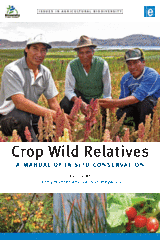Crop Wild Relatives - A manual of in situ conservation
by Danny Hunter and Vernon Heywood
The Crop Wild Relatives (CWR) In situ Conservation Manual is based on the Crop Wild Relatives Project implemented by the GEF and UNEP. The Project has been conduct in five countries; Armenia, Bolivia, Madagascar, Sri Lanka and Uzbekistan, which are all important centers of diversity for CWR.
The Manual captures the important practical experiences of the participating countries and ensures best practices and lessons learned are documented and disseminated to the wider conservation community. By so doing, the Manual also fills an important gap in the in situ conservation literature currently available, since, at present, there is no clear, practical publication to guide practitioners in the many processes and methodologies necessary to implement national CWR action plans and strategies.
The manual has been translated into English, French and Spanish. For ease of use, PDFs of individual chapters in the three languages are also available for download in the Capacity building - eLearning section of the portal, under their respective modules.
Why is <i>in situ</i> conservation of CWR important?
Crop Wild Relatives are plant species which are more or less closely related to crops. They are a vital resource by providing a pool of genetic variation that can be used in breeding new and better adapted varieties of crops that are resistant to stress, disease, drought and other factors. They will be increasingly important in allowing crops to adapt to the impacts of climate, thus safeguarding future agricultural production. However, CWR themselves are vulnerable to changing climate. Until recently, the main conservation strategy adopted for CWR has been ex situ - through the maintenance of samples as seed or vegetative material in various kinds of genebank or other facilities. Now the need to conserve CWR in their natural surroundings (in situ) is increasingly recognized. This allows their populations to continue evolving and generate new genetic variation that is adapted to changing conditions.
Until now, experience in conserving the wild relatives of crops in situ has been very limited. Recent research co-ordinated by Bioversity International has produced a wealth of information on good practices and lessons learned for their effective conservation This book captures the important practical experiences of countries participating in this work and describes them for the wider conservation community.
The chapters of the Manual
- Introduction: Crop Wild Relatives (CWR)
- Crop Wild Relatives in the Project Countries
- What do we Mean by In Situ Conservation of CWR?
- Planning for CWR Conservation and Partnership Building
- Participatory Approaches for CWR In Situ Conservation
- National CWR Strategy/Action Plans
- Selection and Prioritization of Species/Populations and Areas
- Establishing an Information Baseline: Ecogeographic Surveying
- Protected Areas and CWR Conservation
- Species and Population Management/Recovery Plans
- Conservation Strategies for Species/Populations Occurring Outside Protected Areas
- Complementary Ex situ Conservation Actions
- Monitoring of Areas and Species/Populations to Assess Effectiveness of Conservation/Management Actions
- Adapting to Global Change
- Capacity Building and Training
- Communications, Public Awareness and Outreach
Highlights
eLearning
A set of training modules. A complementary tool to Crop Wild Relatives - A Manual of in situ Conservation.

